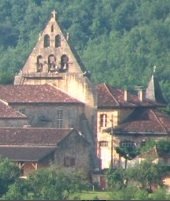
Okay, it was inevitable. You start a blog. You try to keep it highbrow, literary, interesting for a wide audience. But sooner or later, you post pictures of your dog. Here's Koffie, doing his best impression of a charming stray.
A new life in rural France

| Blog: |
| Deep Quercy |
Topics: |
| france, travel, country living |
After many weeks of silence, I’m back. And I am not alone.
A small black dog watches me as I type this. It’s early morning, the weather’s good, and I’m out on the terrace overlooking the vegetable patch – the tomatoes are huge and just starting to ripen, long green cayennes twist and dangle from the slender branches of the pepper plant, courgette flowers raise their crinkled yellow faces to the warm summer sun and the rather terrifying pumpkin vines grow several inches a day as they quietly plan world domination. The tiniest of caterpillars is working its way, millimeter by millimeter, up the edge of my screen.
On the other side of the field, the cottages are full of newly-arrived guests, tired from their long trips from England, Belgium and the Netherlands. All our frantic work of this spring is now being paid off by happy holiday-makers enjoying the beginning of the summer season in the Quercy. I’ll be running to the village baker in a few minutes to buy bread – still hot from the oven this time of morning - and croissants to deliver to the guests. It’s our busy season, and it’s not all bad.
But suddenly this dog has been added to the equation. He is now officially named Koffie. He is officially ours. And, given his taste for 6:00am walks, I am officially ambivalent about it.
Koffie showed up last week. Strays aren’t uncommon here: we often get visits from the dog of the previous caretakers of our house, who now live in a hamlet a few miles away. The occasional disoriented and famished hunting dog wanders onto our land in winter. But this was different: this friendly little terrier/dachshund/n’importe-quoi mix we’d never seen before, with no collar, suddenly taking up residence in the playroom of our cottages was a visitation of a different order. We called all our neighbors, took him to the vet to scan him for a chip, asked the mayor and the baker’s wife. No luck. Or rather, luck. Sebastian has dreamed of having a dog for years now. We’d already fallen in love with the little creature, much to the chagrin of our cat (also a foundling). No tag, no collar, no one to claim him – make yourself at home, Koffie. And stop chewing on my shoes.
We’ve spent some time puzzling over just how he got here, but the locals all have the same reaction. Someone didn’t want him anymore, so they drove at least 20 km from home, found a lonely little country road and dumped him out of the car. Apparently it happens all the time. The vet didn’t even blink. It is, I suppose, a reminder that until very recently this was a region of subsistence farmers where animals served two purposes: food and labor. Dogs were for hunting, for herding sheep, for killing rats. And when they no longer served a practical purpose, they were discarded. That attitude lingers today, not just in the despicable way in which some hunters here treat their hunting dogs, but even among townspeople with regard to pets.
But it’s not all so dire, as I was reminded yesterday evening when the three of us took Koffie for a walk. We walked up towards the neighboring farm keeping Koffie on a leash to prevent him from chasing Madame’s sheep, who are deeply ambivalent about his arrival. Madame came out of her house to say hello and to meet the new member of our family. It’s always a bit of a linguistic adventure, these chats with Madame. She dishes out her generous portions of local lore in a thick Quercy accent, heavily seasoned with Occitan words like “nosotre” instead of the French “nous.” And then, of course, we get onto the subject of animals.
Madame has her own fair share of animals. Her own little foundling dog Chocolat vanished last year, but was quickly replaced by a beautiful white foundling cat. And while she isn’t a self-sufficient farmer as she was when her husband was still alive, Madame still manages, with some help from her children, to care for a small flock of sheep and an enclosure full of smaller animals. While I held Koffie, she took Sebastian around to show him the rabbits, chickens, ducks and geese. I could hear Sebastian telling her about the rabbit we used to have, rescued from Cazals market where she was being sold as an ingredient for a stew. Sebastian came back with a handful of feathers and a beaming face, and then Madame took us over to the cage where she keeps her doves.
“This one is also a foundling, a wild turtle-dove” she explains, pointing to a small dark bird among the dingy white doves fluttering around the cage. “You know the Souveton family, who sell their wine at the evening market in summer? Last year, la fille was there, selling wine, when this dove fell out of the big mulberry tree right in front of her. She cared for it a while, then gave it to me to keep.”
Stray dogs, lost cats, wild birds falling from trees. Everyone around here has similar stories behind their own accumulation of foundling animals. If there is much cruelty here, there is equally an impressive amount of kindness towards lost animals that find their way onto farms and into village houses.
“I like to hear the doves sing in the mornings,” Madame tells us just before we go. And then she gives us one of her wry smiles.
“They’re not for eating,” she adds.